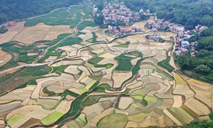Interview: World Bank economist says export controls fuel global food inflation, worsen food crisis
BANGKOK, May 8 (Xinhua) -- Countries' slamming export controls will fuel the global food inflation, worsen food crisis in many countries and cause long-term impacts on global food trade, a World Bank economist has said.
World Bank East Asia and Pacific Chief Economist Aaditya Mattoo said export controls in specific product can provoke new restrictions to insulate domestic markets, which would have a multiplier effect on world prices. "Even the exporters themselves can lose out when world prices spiral up," he said.
"It's as if you're in a stadium, if everybody stands up to see better, everyone is less comfortable, but no one gets a better view," he told Xinhua in a recent interview.
According to the Agricultural Market Information System, an inter-agency platform launched by the G20 Ministers of Agriculture for food market transparency and policy response for food security, since the Russia-Ukraine conflict started in February, the number of countries imposing export restrictions on food has risen to 23 as of late April, and the total amount of exports affected by the restrictions represents 17 percent of total calories traded in the world.
Mattoo said in past crises, when the global prices shot up in 2008 and 2011, governments imposed more than 80 new restrictions on food products, and research showed that those actions pushed up world prices by another 13 percent to 15 percent.
Besides the production disruption amid the Russia-Ukraine conflict, he said current food price increases also reflect the expectations of shortage due to concerns over greater disruptions, more stringent sanctions on Russia and more countries resorting to export restrictions that will make the situation worse than it would have been.
The World Bank economist warned that a food crisis has already been plaguing many countries that are heavily dependent on grain imports from Ukraine and Russia. "If the disruption persists, and if policy takes a perverse turn, the situation will be even harder, especially for small and poor countries who don't have their own supplies," he said.
For the long-term consequences, Mattoo said if in bad times, importing countries are shut out by producing countries, trade would be seen as an unreliable way of securing access to essential products, while self-sufficiency through protection would seem the best insurance against scarcity in bad times, and the shifting away from openness will be costly for all.
As a result, "food will cost more, variety will suffer, quality will suffer, and we'll lose the benefits of economies of scale and specialization," he said.
Aside from the Russia-Ukraine conflict, Mattoo said tighter global financial conditions amid the U.S. Federal Reserve's faster tightening of monetary policy and continuous spreading of COVID-19 also create headwinds for economic growth in East Asia and the Pacific region.
Mattoo said that to address these challenges requires global cooperation, and that "keeping trade open is crucial, especially in the East Asia and Pacific region, which has become more integrated."
He also advised countries to grasp the opportunities of shifting patterns of trade and faster diffusion of technology, enhance fiscal and financial cooperation, and create infrastructure for the diffusion of new technologies.
Overall economic growth in developing East Asia and Pacific countries is projected to slow to 5 percent in 2022, 0.4 percentage point less than expected in October, according to the World Bank's recent East Asia and Pacific Economic Update.
Photos
Related Stories
- World Bank expects debt crisis to continue to worsen in 2022
- World Bank projects developing East Asia Pacific to grow 5 pct in 2022
- WB raises forecast of nation's GDP growth
- World Bank economist disappointed by vaccine nationalism, calling for trade openness
- World Bank sees setback in East Asia and Pacific's recovery amid surging Delta variant
- World Bank approves 630 mln USD for China environmental projects
- World Bank upgrades China's growth forecast to 8.5 pct in 2021
- Widespread informal economic activity likely to slow recovery in EMDEs: World Bank
- World Bank to provide Bangladesh 250-mln-USD loan for employment generation, COVID-19 impact mitigation
- World Bank projects global economy to grow by 4 pct in 2021 with widespread vaccination
Copyright © 2022 People's Daily Online. All Rights Reserved.










